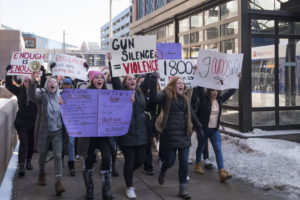
By Elizabeth Echard, Staff Writer
Since 1966, 1,077 victims, ranging from the unborn to the elderly, have been killed in America in mass shootings.[1] While no universally accepted definition for “mass shooting” exists, these statistics look to the 150 shootings in America where four or more people were killed by a lone shooter, or in a few cases two shooters.[2] The perpetrators of these events used 292 guns,, almost double the number of shootings. Of the 292 guns, 57% were legally obtained and 17% were illegally obtained, leaving roughly 26% unaccounted for.[3]
Now comes the question: where do we look to stop these senseless killings?
One heavily-discussed avenue is imposing stricter gun control policies and looking to foreign nations as models for these policies. Both Britain and Australia implemented stricter gun laws,[4] yet neither nation experienced drops in mass shootings or gun-related crimes attributable to their tightened laws.[5] Rather, the gun restrictions were deemed to have an ambiguous effect on gun-related deaths in each country.[6]
Tightened up gun policies are typically directed at “assault weapons,” which are any semi-automatic guns that include two or more of the following features: bayonet mount, rocket propelled grenade launcher mount, a folding stock, or a pistol grip.[7] Research has shown that, generally, gun owners do not walk into a gun shop and purchase an assault weapon.[8] Rather, assault weapons are found to be of an “invented” nature.[9] Guns are classified as modular, meaning any gun hobbyist can easily add these features at home, as if playing with building blocks.[10] Gun control laws would put limitations and restrictions on those who legally purchase guns from gun shops, but they leave weak coverage over the “homemade” assault weapons or the illegally obtained weapons.
Should America turn to stronger mental health awareness? Of the 153 shooters, some were known to have violent tendencies or criminal pasts, but some seemed generally fine up until the point of attack.[11] Researchers do find a correlation between mental illness and mass shootings to be evident. Between 50% and 60% of shooters who commit mass shootings in America had either been diagnosed with a serious mental disorder or exhibited crucial signs of serious mental illness before carrying out the attack.[12] Since the early 1900’s, only one third of people who committed mass shootings sought or received mental health treatment prior to their attacks.[13]
On the other hand, some believe that correlation between mass shootings and mental illness is a misconception, stating that mass shootings create public horror and outrage, linking these attacks to mental illness as pure assumption.[14] These researchers believe that some helpful policy considerations may include focusing on an individual’s behaviors, emphasizing a need for third party reporting, developing specialized forensic threat assessment teams to evaluate the seriousness of their party reports, and enhanced education, beginning at an early age, focusing on constructive coping skills for anger and conflict resolution, mental health, and mental wellness education.[15]
What all sides seem to agree on is that: (1) a majority of perpetrators obtained their weapons “around” the law (using their own guns or obtaining easily accessible guns from the homes of friends or family), (2) perpetrators often “leaked” their intent to their peers or exhibited behavior prior to the incident that caused others serious concern, and (3) perpetrators had often contemplated or attempted suicide.[16]
All sides also agree that mass shootings in America must be addressed. In order for effective laws to be enacted, the legislature should look at the big picture and consider the pros and cons of each proposed option. What truly is the proper remedy to mass shootings in America: gun control, mental health awareness, or something else?
Sources
[1] Bonnie Berkowitz, Denise Lu, and Chris Alcantara, The terrible numbers that grow with each mass shooting, https://www.washingtonpost.com/graphics/2018/national/mass-shootings-in-america/?utm_term=.086dd23848f7 (updated February 16, 2018).
[2] Id.
[3] Id.
[4] Leah Libresco, I used to think gun control was the answer. My research told me otherwise., https://www.washingtonpost.com/opinions/i-used-to-think-gun-control-was-the-answer-my-research-told-me-otherwise/2017/10/03/d33edca6-a851-11e7-92d1-58c702d2d975_story.html?utm_term=.ab4e450cccf1 (October 3, 2017).
[5] Id.
[6] Id.
[7] Id.
[8] Id.
[9] Id.
[10] Id.
[11] Bonnie Berkowitz, Denise Lu, and Chris Alcantara, supra
[12] Grant Duwe and Michael Rocque, Actually, there is a clear link between mass shootings and mental illness, http://www.latimes.com/opinion/op-ed/la-oe-duwe-rocque-mass-shootings-mental-illness-20180223-story.html (February 23, 2018).
[13] Id.
[14] James L. Knoll and George D. Annas, Mass Shootings and Mental Illness, https://psychiatryonline.org/doi/pdf/10.5555/appi.books.9781615371099 (2016).
[15] Id.
[16] Id.